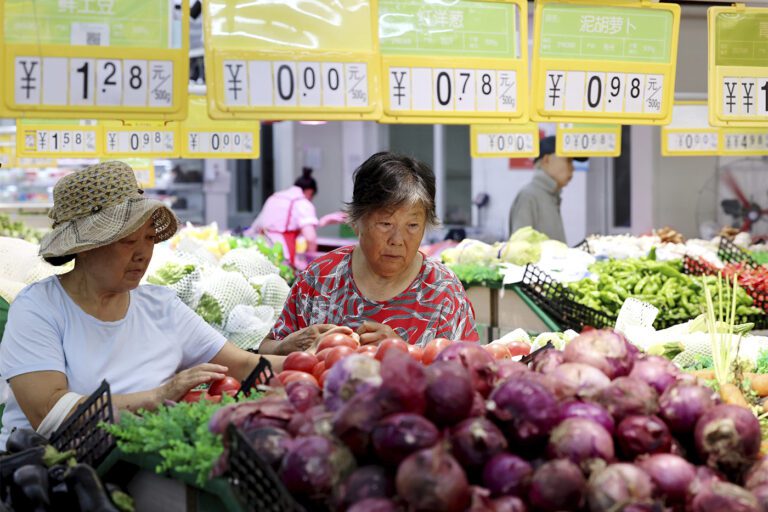While the United States struggles with inflation, China, the world’s second-largest economy, appears to have the opposite problem: deflation.
In July, consumer prices fell in China for the first time in two years. Several economic problems have hit China since COVID-19 restrictions were lifted. Exports have fallen and the real estate market is in decline.

The Chinese economy has slipped into deflationary territory.
But what exactly is deflation and why? worried people on this subject?
William Dickens, distinguished professor of economics and social policy at Northeastern University, explains that while the opposite of inflation may seem positive, deflation is a problem you don’t want to have…
Responses have been edited for clarity and brevity.
What is deflation?
Deflation is the opposite of inflation. An economy is said to be in deflation when the general price level is falling. The general price level is measured by one or more indices such as the well-known consumer price index.
Is deflation different from falling inflation?
Disinflation (decline in inflation) is the slowing down of price increases. Deflation causes prices to fall.
Falling inflation is normally seen as a good thing. Most of the world’s central banks want to keep inflation around 2%, lower than most countries currently experience. However, inflation rates below 2% are avoided due to the risk of the economy falling into deflation.
You may think that lower prices are a good thing, but we must not forget that wages are also a price. In times of deflation, wages and prices fall, so purchasing power does not increase.
However, if you have a lot of debt, falling wages force people to work longer to pay off their debts. It also means people have less real purchasing power, leading to lower consumer demand, putting further downward pressure on prices and wages.
Falling prices also mean businesses have to sell more goods to pay off debt. They often fail to do so and are forced into bankruptcy. This causes more unemployment and once again reduces purchasing power and demand.
This vicious cycle hit Japan in the 1990s, causing more than a decade of economic decline and then stagnation. China is a highly indebted country with a very weak banking system. Deflation could be disastrous.
Why is deflation happening in China?
First, it might not be the case. One month of falling prices may be a statistical fluke. But conditions in China are ripe for deflation. Inflation has been very low and both external and domestic demand have been weak. Domestic demand is weak because the economy has not recovered from China’s disastrous COVID policies. Foreign demand is falling because Western countries want to disengage their economies from China, fearing major economic problems if China attempts to bring Taiwan under continental control by force or if China’s claims to the waters of the South Sea South China led to a confrontation. Russia’s invasion of Ukraine was a lesson to the world about the unpredictability of authoritarian governments.
Will this affect the US economy?
If China enters a full-blown period of deflation, there may be knock-on effects for the U.S. and global economies. The United States will be less affected than other countries because we export little to China. A collapse in Chinese demand would therefore have little immediate impact on the United States. Third world exporters of raw materials and food products will be most affected. Many of these same countries are saddled with crushing debt to China. This could lead to some defaults in developing countries.
Of greater concern are possible global financial impacts, particularly a financial panic. I guess that won’t happen. China is a net lender to the world. Its debt is mainly held internally. I doubt that major Western banks will have difficulty coping with a Chinese default, which could follow an economic collapse. I am more concerned about the exposure of Western banks to the debt of developing countries which risk suffering from a drop in Chinese demand.
What are you waiting for to see if China actually falls into deflation?
Another month or two of falling prices and it will be difficult to call this a coincidence. The consequences will take time and I suspect the government will try to cover up and cover up the problem. Being an authoritarian state, they have more tools than a Western government would have.
Are you worried?
Not yet. And to the extent that I do, these are more brainstorming issues than purely economic issues.
Cyrus Moulton is a reporter for Northeastern Global News. Send him an email to c.moulton@northeastern.edu. Follow him on Twitter @MoultonCyrus.


